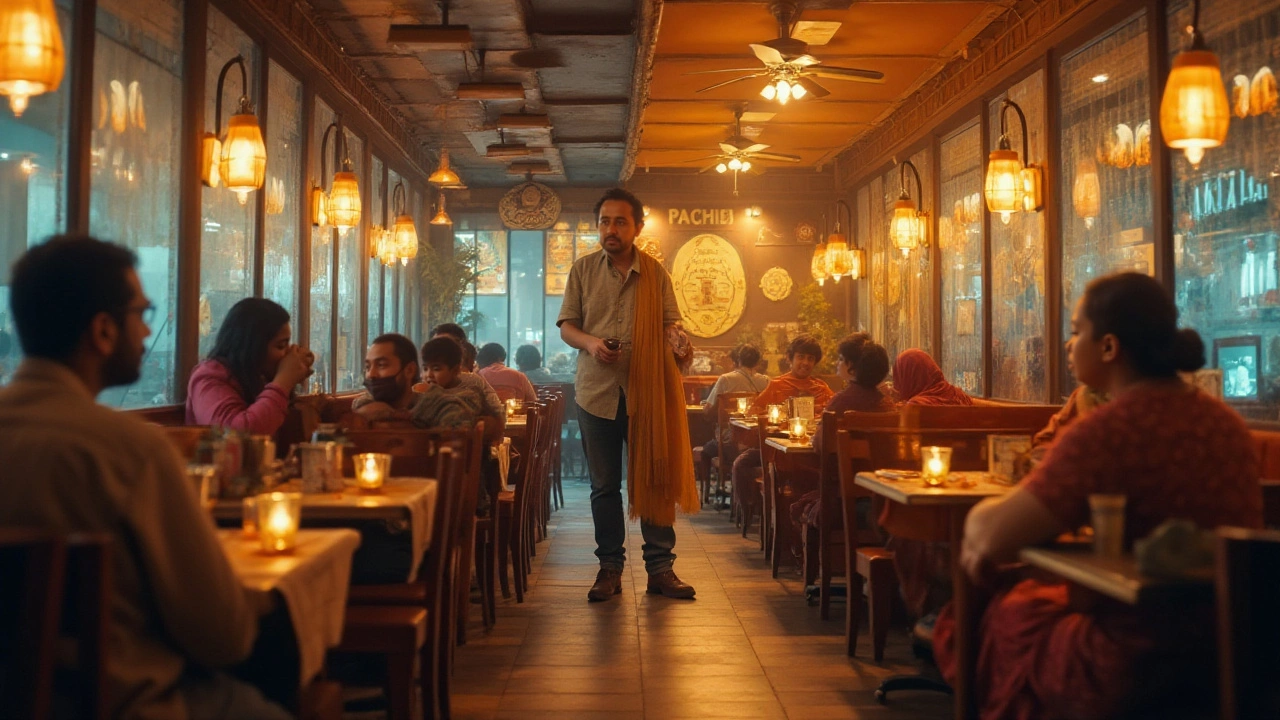Starting a business through a franchise can seem like a golden opportunity. In India, where business potential is vast, diving into a franchise is often viewed as a fast-track to entrepreneurial success. But is it really that straightforward?
Many dive into franchising without fully grasping the potential pitfalls that lie beneath the surface. These can range from unanticipated financial drains to cultural mismatches that can turn a promising venture into a challenging ordeal.
While the idea of riding on the brand recognition of an established company sounds enticing, aspiring franchisees must weigh their options carefully. Understanding the deeper intricacies of the franchise model, especially within the diverse Indian market, can be the make-or-break factor in deciding whether this route is truly the best fit for their entrepreneurial dreams.
- The Allure of Franchising in India
- Hidden Costs and Financial Risks
- Cultural and Regional Challenges
- Control and Flexibility Issues
- Case Studies of Franchise Failures
- Strategic Considerations for Aspiring Entrepreneurs
The Allure of Franchising in India
In a country as dynamic and diverse as India, franchise opportunities have emerged as an attractive venture for many aspiring entrepreneurs. The appeal of franchising lies in its promise of leveraging an already established brand with proven business models, thereby offering a sense of security that can be elusive in more traditional start-up ventures. This business model, bolstered by a rapidly expanding consumer market, creates a fertile ground for franchises to blossom.
India's economy, among the world's fastest-growing, has provided a vibrant backdrop for the expansion of countless franchises. With the emergence of a more affluent middle class and a population characterized by youthful exuberance, businesses have access to a swath of eager consumers. Entering the market with a well-recognized brand can mean bypassing years of building a reputation and consumer trust from the ground up. The allure doesn’t end there; potential investors are also drawn by the comprehensive training and support systems offered by most franchises. This operational guidance can significantly lower the barriers to entry, reducing the steep learning curves and disheartening failures often associated with starting a new business.
A crucial aspect of this allure is the cultural diversity that India's vast landscape offers. With no two regions being identical in consumer behavior and preferences, franchises provide the opportunity to tap into localized markets effectively. As noted by leading retail analyst Rajiv Nair,
"When a franchise adapts its model to accommodate local tastes while maintaining its core values, it enjoys the best of both worlds. It can be both global and local in its appeal."This flexibility enables franchises to resonate with a broader audience while maintaining operational consistency, a significant selling point for any business vying for market share.
Moreover, as more international brands seek to enter the Indian market, local franchisees become critical stakeholders. These roles allow them to benefit from international standards and innovations while perpetuating demand for high-quality goods and services. As the nation's infrastructure improves, supported by government initiatives to bolster the economy, there's a tangible excitement surrounding the myriad possibilities within the franchising sector. These factors combined illustrate why the dream of owning a India franchising business is so compelling. However, it's equally important to navigate this journey with a critical eye, recognizing that what glitters isn't always gold, especially in a market as unique as India's.
Hidden Costs and Financial Risks
Stepping into the world of franchise opportunities in India often looks appealing because of the perceived simplicity associated with operating a business under a well-known brand. However, potential investors should not be blinded by the dazzling success stories alone, as the financial landscape can be riddled with hidden costs and risks that aren't immediately apparent. Let’s delve deeper into these aspects to understand why they pose a significant challenge to aspiring franchisees.
One of the most pressing concerns is the initial franchise fee, which can be exorbitantly high, making it a daunting entry barrier for many. These costs aren’t just limited to the franchise fee; they often include additional expenses such as renovation of the outlet to match brand standards, training programs, marketing fees, and ongoing royalty commitments. These control expenses can quickly culminate in a financial burden heavier than initially anticipated. Research shows that on average, franchises demand a royalty fee of 5-10% of gross sales, a significant chunk of a business’s income that directly affects profitability.
Aside from these established fees, prospective franchisees must also prepare for unexpected financial obligations. For example, adapting infrastructure to local markets can incur unforeseen costs, from tailoring marketing strategies to changing the supply chains or even modifying products to suit regional preferences. These adaptations are essential in a country as diverse as India, where customer expectations can shift dramatically from one region to another. Ignoring these localized customs and tastes can lead to an expensive oversight, diminishing profit margins and potentially jeopardizing the entire business operation.
It’s also crucial to understand the financial risks associated with economic downturns or market slumps. In such scenarios, franchises may remain obligated to pay royalties and marketing fees irrespective of their financial health, pushing them into untenable situations. According to a 2023 report by Franchise Business Review, nearly 40% of franchise owners expressed concern over profitability due to such fixed costs burdening them during slow economic phases. This aspect of the franchise model requires serious consideration, as not every franchisor is flexible or willing to negotiate terms during economic downturns.
Moreover, hidden costs often sneak in through unexpected legal fees. By virtue of being part of a larger brand, franchisees are also exposed to legal complexities that may arise from consumer complaints or intellectual property disputes. These issues can escalate if the franchise agreement lacks clarity or leaves room for interpretation, requiring legal advice and potentially leading to costly litigation.
"Franchising might seem like an appealing shortcut to success, but aspiring franchisees must do their homework. Digging deeper into the numbers can reveal costs and risks owners might not expect," said Ravi Subramanian, a franchise consultant renowned for helping businesses navigate through such turbulent waters.
Given these risks, aspiring franchisees should perform thorough due diligence before signing any agreements. Engaging in discussions with current franchisees can provide valuable insights into the potential financial pitfalls and help paint a clearer picture of the real costs involved. Additionally, hiring accountants or financial advisors experienced in franchising can be invaluable in assessing the financial aspects from a more comprehensive perspective. These proactive steps ensure that the dream of starting a franchise doesn’t turn into a financial quagmire.

Cultural and Regional Challenges
Navigating the diverse cultural landscape of India is no small feat, and when it comes to franchise opportunities, this becomes particularly pertinent. India is not just a single market but a collection of vastly unique territories, each with its own preferences, traditions, and consumer behaviors. Consider the deep-rooted tradition of tea in many Indian states. While coffee giants might see this as a market ripe for caffeine conversions, they often underestimate the steadfast devotion locals might have to their beloved chai, a cultural cornerstone not easily replaced.
Cultural nuances can also significantly impact the success of a franchise. For instance, in regions with a strong vegetarian culture, a fast-food chain known for its beef hamburgers might struggle, needing to adapt its menu entirely to fit local tastes and religious considerations. It’s more than just altering the product offering—it involves a genuine understanding and respect for local traditions and sensibilities. Richard Branson once said,
"Every success story is a tale of constant adaptation, revision, and change."In the context of Indian franchising, this couldn't be more accurate.
Beyond cultural preferences, linguistic diversity is another layer of complexity. India recognizes 22 languages officially, and this doesn't even begin to capture the countless dialects across its states. Franchisees must be prepared to communicate effectively in multiple languages, not just for marketing purposes, but in staff training and operations as well. A brand's success might hinge on its ability to speak the customer's language, both literally and metaphorically.
Region-specific marketing strategies are crucial in catering to local tastes and habits. For instance, a campaign that resonates in urban hubs like Mumbai might not translate well in smaller townships or rural areas, where lifestyle and purchasing power can differ greatly. Adapting marketing strategies to fit regional quirks is essential to ensure that the brand message is clear and compelling across various demographics.
The geographic diversity also poses logistical challenges. Different climates and infrastructures across the country can affect supply chains and operations. For example, monsoon season in certain parts could delay deliveries, impacting franchise outlets that rely on precise product deliveries. Entrepreneurs need to understand these regional differences and plan accordingly to mitigate possible disruptions.
Success Through Adaptability
The ultimate key to overcoming these cultural and regional challenges lies in adaptability and sensitivity. Franchisors and franchisees are encouraged to engage deeply with local knowledge and experts to navigate these intricacies. Without an understanding of the regional dynamics at play, even franchises with global recognition can falter in India. Hence, anyone considering this route should be ready to adapt their business model to match the local flavor, quite literally.
Control and Flexibility Issues
When setting up a franchise, one of the first things aspiring business owners must grapple with is the level of control—and limitation—that comes hand in hand with the franchising model. The franchise landscape is designed to maintain a uniform brand image across all its locations, which often translates into tightly regulated operational procedures for the franchisee. For many, especially in a country as diverse as India, this can turn into a double-edged sword. While you might think you're getting the solid backing of a well-known brand, the actual experience might feel more like you're bound by invisible chains, with limited room to express your local business acumen.
The strict guidelines imposed often cover every aspect of the business, from marketing strategies to store decor and the menu items or services you offer. As a result, franchisees can often feel like mere cogs in the wheel, unable to adapt flexibly to local market demands or consumer preferences, which can be quite nuanced in the Indian market. This can be particularly frustrating in a dynamic business environment where agility and adaptation are key to success. Imagine owning a restaurant franchise in a region with a strong preference for vegetarian cuisine, only to find out that alterations to the menu require a lengthy approval process from HQ that ultimately stifles growth.
Moreover, this central control can lead to a significant bootstrapping of creativity. In a traditional business setting, an owner might try a variety of tactics—be it promotional events, localized advertising, or community engagement—to attract and retain customers. However, in a franchise setup, such initiatives need prior approvals and may align with company protocols that aren't always geographically relevant or time-sensitive. This rigidity often costs businesses potentially profitable local adaptations that cater precisely to the clientele they serve.
"There is immense growth potential in the Indian franchise market, but potential franchisees must thoroughly understand the level of control they'll have in day-to-day operations," notes industry expert Neelam Samira, an advisor with over two decades of experience in franchising across Asia.
An unanticipated consequence of this control is also linked to the backlash when conflicts arise between what a franchisee believes is beneficial versus what is mandated by the franchisor. The terms outlined in the franchising agreement can sometimes lack a balance of power, disproportionately favoring the franchisor, putting the franchisee at a disadvantage in collaborative decision-making. This can make the process of resolving disputes or suggesting innovative changes an uphill battle. Therefore, prospective franchise owners should meticulously review their contract agreements to ensure that potential issues of control and inflexibility do not undermine their business aspirations.
The question thus becomes: do the merits of joining an established franchise outweigh the potential lost opportunities due to inflexibility? Aspiring franchise owners must scrutinize franchises not just on their reputational benefits but also on how much freedom they'll retain to employ their unique understanding of local market needs. Exploring all these facets beforehand is crucial to ensuring that choosing to franchise truly aligns with one's vision of business ownership. Navigating these control and flexibility concerns with eyes wide open can make all the difference in successfully launching a franchise opportunity in a market as varied and diverse as India.

Case Studies of Franchise Failures
Diving into the world of franchise opportunities in India is an attractive choice for many aspiring entrepreneurs, yet it is not always the paved road to success it appears to be. Consider the tale of Subhiksha, a retail chain that once boasted the promise of becoming one of India’s largest consumer outlets. Despite its formidable start and rapid expansion, Subhiksha crumbled in 2009 after a series of internal mismanagements compounded by external economic pressures. This case highlights the intricate dance between rapid growth and financial prudence, showing how even well-known brands can stumble if they overstretch themselves without a solid operational backbone.
In another case, Quiznos, a global fast-food sandwich chain, attempted to enter the Indian market with high hopes of capturing a slice of the burgeoning fast-food industry. Unfortunately, they misjudged the local appetite and pricing strategies. Quiznos expected Indian consumers to adapt to higher price points that suited the brand in Western markets. Instead, these prices deterred significant swathes of the potential market, most of whom were unfamiliar with the brand. This miscalculation, combined with stiff competition from more established local and international players, forced Quiznos to re-strategize, highlighting the importance of cultural adaptation and market research.
The Café Coffee Day (CCD) saga is another telling example that dashed the high aspirations associated with India franchising. Despite having a considerable presence and being a beloved brand, CCD ran into financial troubles too. It serves as a reminder of how crucial it is to maintain transparency and efficient financial management. A lack of both, coupled with unsustainable expansion strategies, led to serious repercussions. Beyond just mismanagement, intense competition from globally popular chains like Starbucks also strained CCD's growth, illustrating how important it is to continually innovate and cater to local tastes while sustaining a unique competitive edge.
"Even the best brands falter when expansion plans overlook operational inefficiencies," said Arvind Singhal, a noted retail analyst, commenting on the recurring retail franchise struggles in India.
Another category that witnessed mega failures involved international beauty salons that hoped to allure the Indian crowd with franchising models. Believing they could replicate their Western success stories, brands like Regis faced challenges not only stretching from the difference in aesthetic preferences but also adjusting to differing operational costs and customer service expectations in India. Their journey emphasized how crucial it is to adapt business models when crossing cultural borders to ensure longevity and success.
Examining these failed franchises offers invaluable insights into the crucial missteps that entrepreneurs must sidestep when considering business investment risks linked with franchising. They underline the critical need for detailed market research, cultural adaptation, financial prudence, and the ability to play the long game with sustained competitive strategy if new franchise ventures are to thrive in the diverse and challenging landscape of India.
Strategic Considerations for Aspiring Entrepreneurs
Before plunging into a franchise opportunity in India, entrepreneurs should strategize meticulously. The vibrant tapestry that makes up the Indian marketplace requires more than a one-size-fits-all approach. Rather, it demands a deep understanding of local nuances, both culturally and economically. It is not merely about bringing a global brand into a new area. It involves adapting to local tastes, behaviors, and spending habits. Take the example of how fast-food giants altered their menus to fit cultural inclinations, providing spice-infused local favorites to cater to Indian palates.
Fiscally, the allure of franchising often comes with entanglements not foreseen by many. High franchise fees can burden the unprepared, siphoning off potential profits. Entrepreneurs need to be acutely aware and budget accordingly, preparing for both the upfront costs and ongoing royalties that will impact cash flow. A detailed financial plan, potentially developed with a local expert familiar with Indian economic trends, can spell the difference between thriving and surviving. Knowing your break-even timelines and leveraging data-driven projections makes one well-prepared to handle unexpected challenges.
"Franchising brings rigidity," says Sameer Bansal, a renowned business strategist in Mumbai. "Only those who learn to adapt swiftly can breach the challenge of standardized models versus local demands."
Another pivotal element in strategizing is understanding control dynamics. Franchisors often enforce strict regulations regarding brand image and operations, which can stifle innovation. Aspiring entrepreneurs need to weigh the benefits of using a well-known brand against the restrictions that come with it. Flexibility is key, and finding a franchisor willing to allow some leeway can greatly enhance success chances.
- Research potential franchisors thoroughly. Scrutinize their track record in India and evaluate whether past franchisees have thrived or struggled.
- Interact with multiple existing franchise owners to gather insights beyond the glossy brochures.
- Consider the competitive landscape in the desired area of operation. Analyze what niche remains untapped and how the franchise can fill it.
Finally, strong community engagement can catalyze a franchise’s success. Building relationships with local stakeholders, and participating in neighborhood events, not only enhances brand loyalty but also fosters a richer understanding of customer needs. When investing in a franchise, it’s these grassroots interactions that often drive sustainable growth. Through these thoughtful and strategic steps, entrepreneurs can navigate the complexities of franchising in India more adeptly, ensuring they don’t just survive, but thrive.

